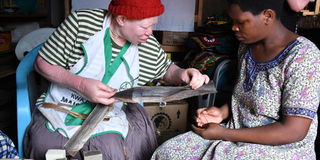Prime
Earning from organic products: The story of Mama Muzungu

Scovia Namirembe alias Maama Najib (left), and Gertrude Nantumbwe, also known as jajja (grandmother) consult during the packaging process. PHOTOS | EDGAR R. BATTE
What you need to know:
- Mama Mzungu is a social enterprise soap making initiative that was born under the economic empowerment arm of Wacwau. The women have cultivated sustainable job creation, economic empowerment, self-reliance, and changing the image of those affected by albinism.
She concentrates, carefully cutting each cake of soap with precision. Teopista Bagala is the production manager at Mama Mzungu, an initiative of women and children living with albinism.
After cutting the soap, she piles it then passes it on to Sumaiyia Nakilanda who is commonly called Maama Sam, Scovia Namirembe and Gertrude Nantumbwe, also known as Jajja (grandmother). Nantumbwe is also the store keeper.
The dream
On getting the soap, the three women reach for neat paper, some of it branded, which they use to wrap the soap and then tie it up with banana fibre.
It was the unique packaging that caught the eye of your writer while on his stay at Rainforest Lodge in Mabira Tropical Forest Reserve.
Mama Mzungu is a name the group adopted from the community among which they live in Wakiso District.
Starting
In 2017, they launched Women and Children with Albinism in Uganda (Wacwau), a non-governmental organisation (NGO) that aims at serving the needs of the most vulnerable in their community.
Diana Bakuyita, the project manager, says that whereas many politely called them mama mzungu (mother of a white person), from the colour of their skin, others used it as a form of mockery.

Diana Bakuyita makes a point during the interview. She says Mama Mzungu was started to offer a source of livelihood to albino mothers and children.
Nonetheless, they embraced the name under which they make soap as a form of economic empowerment. The group was mentored into the initiative by Monica Norley, an international development consultant from the United Kingdom (UK).
“She found us working on some stuff already and she encouraged us and advised us to make natural soap. She trained and showed us the business perspective of running the initiative. She also gave us exposure on how to use social media and online platforms to showcase our products. We have met many customers on social media,” Bakuyita explains.
Social media
Mama Mzungu runs an active online platform where potential local and international clients can reach them and access their products. They used their website to create awareness about their economic initiatives as well as albinism.
“Across Africa, people with albinism experience human rights violations and abuses. Our economic, political, social, and cultural rights are often compromised in devastating ways. Societal ignorance about Albinism has contributed to exclusion, stigmatization, and the denial of basic rights such as education and health,” their website, https://www.mamamzungu.co/, elaborates, in part.
Making soap
Mama Mzungu is a social enterprise soap making initiative that was born under the economic empowerment arm of Wacwau. The women have cultivated sustainable job creation, economic empowerment, self-reliance, and changing the image of those affected by albinism. Their enterprises are housed at the home of Rebecca Mayanja, a mother to Doreen Nawejje. “She did not abandon her child. She believed in her and cheered her up. Doreen is a professional artist who used to teach at Nkumba University,” a joyful Bakuyita narrates.
Clientele
On Mama Mzungu’s client list are Aquarius Kigo Resort in Lweza, Kikonko Lodge near Lake Albert, Little Elephant Lodge in Queen Elizabeth National Park, Isunga Lodge in Kibale National Park, Rwakobo Rock in Lake Mburo National Park, as well as individual customers and business stockists in Kampala and Kayabwe near the equator.
“The lodges and guest houses make orders every month. Various hotels have been very supportive too,” says Bakuyita. Kisa Projects, observes and explains that making soap is a profitable business.
“Soap is a traditional washing compound made from oil fats and caustic alkali. It is an item of daily necessity as a cleaning agent. There are few specialty soaps like the washing soap especially laundry bar soaps, medicated soaps, toilet soaps, and baby soaps,” an article on their Facebook page partly states.
Prices
A cake of soap that measures 140 grammes at Mama Mzungu, costs Shs8,000 while a bar which is a combination of five cakes, costs Shs30,000. A small cake costs Shs1,000.
“Our soaps are good for any skin type, be it women, children, and men. We source our raw materials from women who grow these natural plants. We have city suppliers for the base oils,” Bakuyita explains.
Uganda Investment Authority (UIA), the agency mandated with promoting investment opportunities in Uganda identified making soap as an affordable and sustainable enterprise.
It organised training in conjunction with Uganda Industrial Research Centre at Kihihi, Kanyantorogo in Kanungu District to promote Small and Medium Enterprises’ products and service standards in 2016.
Other products
Bakuyita says making soap from organic plants promotes what nature can offer. Besides soap, the women and children make hand-sewn bags, customised gift bags, laptop bags, seven and five-piece table mats, foldable shopping bags, and aprons.
Laptop bags are sold at Shs30,000 while table mats go for Shs50,000. They also make indoor scandals, sponges with embroideries, cloth wallets, peppermint and lemon flavoured lip bums, body bum can be used as vaseline; natural; products, sheer butter and add essential oils, for example, lemongrass (Kisubi), turmeric, lavender, coffee, cinnamon, and cloves.
Their production process for the different items is a cold one. No heating is involved. They use weighing scales to measure quantities for the different sizes of soaps and oil.
“We know the grammes of oil needed to produce a given quantity. We have a weighing scale for measurements. Just as a person makes a cake, ensuring the right quantities and measurements, so do we,” says Bakuyita.
“Many organisations are efficient and have resources but not effective. We reach the grassroots. We are hands-on. We got to the market together and help each other through economic empowerment projects. Some of the members are single parents so the income from the self-help projects enables us to supplement the income of the family,” the project manager further adds.
Mama Mzungu’s initiative directly employs 12 women who are paid a monthly salary. “With their monthly salary, they are able to take care of their family and children. They can survive as women and that means they are socially and economically empowered,” she says.
She adds that they focus on women who give birth to albinos because of the numerous needs they need to take care of. “Albinism has needs, some known, some unknown, and those you have never seen. People forget that albinism cuts across all ethnicity and species. It is even in plants, so this lack of melanin doesn’t make me less of a person. With this economic empowering project, women are directly involved, and with or without the involvement of the father, she will work hard to support the child and provide a good life for them.”
Bakuyita adds: “We are still growing and we don’t have an enormous team yet but we are determined. We want to see to it that people like us get an education and are self-reliant and they are living a happy life. That when a child is born with albinism, a parent knows how to take care of that child, that they have a right to study like any other child.”
Besides the women who work at their Wakiso-based factory, Mama Mzungu synergistically works with women in different parts of the country, from non-albino societies.
“We want to make this project bigger so it can economically empower the society, and see that more expansion is made. As such, we are working with many suppliers of raw materials that we need in making the different products. When we see the product we need, we buy it from the person who has it. If one has papyrus, we buy. If they have cinnamon, we buy, so they are different suppliers.”
Marketing
Bakuyita adds that they market their products beyond social media and their website. During the visit of the writer, the women were preparing to exhibit some of their products at a Russian festival in Nakasero where they were eager to also sell their products.
On Saturday, they also exhibit and sell their products at a farmers’ market held at Aquarius Resort. Uganda is ranked as one of the world’s most entrepreneurial countries though few of the businesses persevere past their first anniversary.
A master’s academic thesis by Patrick Sunday on ‘An evaluation of causes of failure of micro and small businesses in Uganda’ recommends that government should, as matter of urgency, allocate more resources to the implementation of more of these interventions to enhance the survival of micro and small businesses in the country.
The results of the study revealed that the most serious causes of failure of micro and small business in Uganda are inflation, inadequate capital, poor infrastructure, cash flow problems, high cost of capital, stringent legal framework and regulatory system, inadequate entrepreneurial and business management skills, and poor location. In its insights and recommendation on ‘Women’s’ Entrepreneurship Development in Uganda by Enock Mugabi, International Labour Organisation (ILO)’s consultant, observes that developing a supportive environment for women’s entrepreneurship is important to women’s success.
“This includes helping women to deal with their multiple roles and involving men, families, and communities (as appropriate) in women’s entrepreneurship. Supporting women entrepreneurs’ associations can improve advocacy and services for women entrepreneurs,” it explains, in part.





